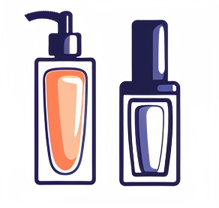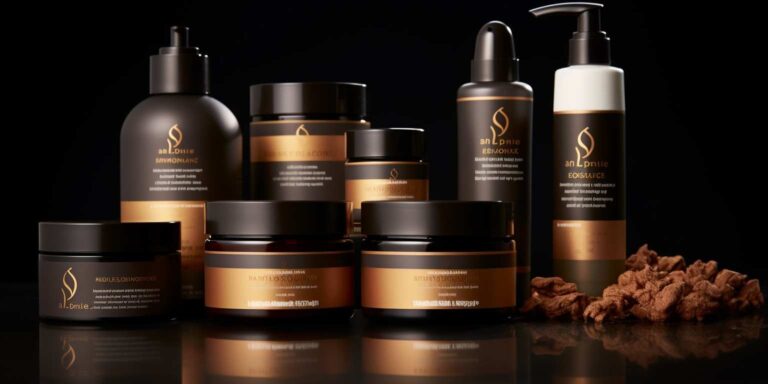Unlocking growth: the best natural shampoo for hair growth
One standout option in the realm of natural hair growth shampoos is the Herbal Harmony shampoo. Packed with a potent blend of botanical extracts, this shampoo not only cleanses the scalp but also nourishes the hair follicles, promoting healthy hair growth.
Key Ingredients:
| 1. Saw Palmetto Extract | Known for inhibiting the production of a hormone linked to hair loss, promoting a conducive environment for hair growth. |
| 2. Biotin | Essential for the production of keratin, a protein vital for hair strength and resilience. |
| 3. Aloe Vera | Calms the scalp, reduces inflammation, and provides a soothing effect, fostering an ideal environment for hair to thrive. |
Scientifically Formulated:
The Herbal Harmony shampoo is scientifically formulated to address the root causes of hair loss. Its pH-balanced formula ensures a healthy scalp environment, promoting optimal conditions for hair growth.
Customer Testimonials:
- Emma K., 35: “I’ve tried numerous products claiming to boost hair growth, but Herbal Harmony is the real deal. My hair feels thicker, and I’ve noticed new growth in just a few weeks.”
- James M., 42: “The natural ingredients in this shampoo make a noticeable difference. My hair looks healthier, and the fragrance is refreshing.”
Usage Tips:
- For optimal results, use the shampoo 2-3 times a week.
- Massage the shampoo gently into the scalp, allowing the nutrient-rich formula to penetrate the hair follicles.
- Pair with a natural conditioner to enhance the overall health and appearance of your hair.
Ingredients that promote hair growth
When it comes to nurturing lush, vibrant locks, ingredients play a pivotal role in fostering optimal hair growth. These key components work synergistically to invigorate hair follicles, strengthen strands, and promote a healthy scalp environment. Whether you’re combating thinning hair or aiming to enhance your mane’s natural resilience, understanding the ingredients that stimulate growth is paramount.
Vitamins and Minerals: A well-balanced diet rich in essential vitamins and minerals lays the foundation for robust hair growth. Vitamin A aids in the production of sebum, the scalp’s natural oil, which moisturizes and nourishes hair. Vitamin E, renowned for its antioxidant properties, promotes blood circulation to the scalp, fostering optimal conditions for hair follicle activity. Additionally, biotin (Vitamin B7) plays a vital role in strengthening hair strands, preventing breakage and promoting growth.
Proteins: Hair primarily comprises a protein called keratin, making dietary protein intake crucial for maintaining hair health. Collagen, a structural protein, enhances hair elasticity, preventing brittleness and breakage. Incorporating protein-rich foods such as eggs, fish, and legumes into your diet can fortify hair structure and support growth.
Essential Oils: Extracted from plants and renowned for their therapeutic properties, essential oils offer a natural remedy for hair concerns. Rosemary oil stimulates hair follicles, promoting circulation and accelerating hair growth. Lavender oil possesses antimicrobial properties, soothing the scalp and reducing inflammation, which can impede hair growth. Peppermint oil is revered for its cooling sensation, which enhances blood flow to the scalp, fostering optimal conditions for hair growth.
| Ingredients | Benefits |
|---|---|
| Biotin (Vitamin B7) | Strengthens hair, prevents breakage |
| Collagen | Enhances hair elasticity, prevents brittleness |
| Rosemary oil | Stimulates hair follicles, promotes circulation |
| Lavender oil | Soothes scalp, reduces inflammation |
| Peppermint oil | Enhances blood flow to scalp, fosters optimal conditions for growth |
Omega-3 Fatty Acids: Found abundantly in fish, nuts, and seeds, omega-3 fatty acids are essential for maintaining scalp health and promoting hair growth. These fatty acids nourish hair follicles, reducing inflammation and supporting hair growth from within.
Amino Acids: The building blocks of protein, amino acids such as arginine and cysteine play a crucial role in hair growth. Arginine enhances blood circulation to the scalp, promoting nutrient delivery to hair follicles, while cysteine strengthens hair shafts, preventing breakage and encouraging growth.
How to apply natural shampoo for optimal results
When it comes to applying natural shampoo for optimal results, there are several key steps to follow to ensure your hair gets the care it deserves. Natural shampoos offer a gentle yet effective cleansing experience without the harsh chemicals found in conventional products. Here’s how to make the most of your natural shampoo:
1. Wet Your Hair: Before applying any shampoo, it’s essential to thoroughly wet your hair. Use lukewarm water to open the hair cuticles, allowing the shampoo to penetrate deeply and cleanse effectively.
2. Use the Right Amount: Natural shampoos tend to be more concentrated than their chemical-laden counterparts, so a little goes a long way. Depending on the length and thickness of your hair, dispense an appropriate amount of shampoo into your palm.
3. Dilute if Necessary: For those with sensitive scalps or dry hair, diluting the shampoo with water can help reduce its potency while still providing a thorough cleanse. Mix the shampoo with water in your palm before applying it to your hair.
4. Apply Gently: Avoid rough scrubbing or aggressive rubbing when applying shampoo. Instead, use your fingertips to massage the shampoo into your scalp and hair in gentle, circular motions. Focus on the scalp to remove dirt, excess oil, and buildup.
5. Rinse Thoroughly: After massaging the shampoo into your hair and scalp, rinse it out completely. Make sure to rinse until the water runs clear, indicating that all traces of shampoo have been removed. Residue left behind can weigh down your hair and cause dullness.
6. Follow with Conditioner: While natural shampoos are often less stripping than traditional ones, it’s still important to replenish moisture and nourishment with a conditioner. Choose a natural conditioner that complements your shampoo for optimal results.
7. Pat Dry: After rinsing out the conditioner, gently pat your hair with a towel to remove excess water. Avoid rubbing vigorously, as this can cause friction and lead to breakage and frizz.
8. Style as Desired: Once your hair is towel-dried, proceed with your preferred styling routine. Whether you air-dry, blow-dry, or use heat styling tools, natural shampoo sets the foundation for healthy, manageable hair.
The science behind hair growth and natural shampoos
The science behind hair growth is a fascinating field that delves into the intricate mechanisms governing the lifecycle of our locks. Understanding how hair grows can shed light on the efficacy of various treatments, including natural shampoos.
At the core of hair growth lies the hair follicle, a tiny pocket within the skin from which hair emerges. The anagen phase is the active growth phase of the hair follicle, during which cells divide rapidly, resulting in the elongation of the hair shaft. This phase typically lasts anywhere from two to seven years, depending on genetic and environmental factors.
Following the anagen phase, the follicle enters the catagen phase, a transitional period marked by decreased cell division and shrinking of the follicle. This phase lasts for a few weeks.
Finally, the follicle enters the telogen phase, wherein hair growth ceases, and the hair is eventually shed to make way for new growth. This phase lasts for several months before the cycle repeats.
Several factors influence the rate and quality of hair growth, including genetics, hormonal fluctuations, nutrition, and stress levels. While some of these factors are beyond our control, others, such as nutrition and stress management, can be optimized to support healthy hair growth.
When it comes to shampoos, the ingredients play a crucial role in nurturing the scalp and hair follicles. Natural shampoos often contain botanical extracts, essential oils, and vitamins that are believed to promote hair health.
One key ingredient found in many natural shampoos is biotin, a B-vitamin that is essential for the production of keratin, the protein that makes up hair strands. Biotin supplementation has been shown to improve hair growth and thickness in individuals with biotin deficiency.
Another popular ingredient is rosemary oil, which has been traditionally used to stimulate hair growth and improve scalp health. Studies have suggested that rosemary oil may increase blood circulation to the scalp, promoting hair growth.
Jojoba oil is often added to natural shampoos for its moisturizing properties. It closely resembles the natural oils produced by the scalp, making it an excellent conditioner for dry and damaged hair.
| Ingredient | Benefits |
|---|---|
| Biotin | Stimulates keratin production, improves hair growth |
| Rosemary oil | Increases scalp circulation, promotes hair growth |
| Jojoba oil | Moisturizes scalp, conditions hair |
Comparing natural shampoos: what to look for
When it comes to choosing the right shampoo, many consumers are now opting for natural alternatives that prioritize organic and chemical-free ingredients. The market is flooded with options, each claiming to be the best, making it essential for consumers to understand what to look for when comparing natural shampoos.
One key factor to consider is the absence of sulfates. Sulfates are harsh detergents commonly found in conventional shampoos that can strip the hair of its natural oils, leading to dryness and irritation. Opting for a natural shampoo that proudly declares itself sulfate-free ensures a gentler cleansing experience.
Another crucial aspect is the use of essential oils. Natural shampoos often harness the power of essential oils such as lavender, tea tree, and peppermint. These oils not only impart a delightful fragrance but also provide various benefits for the scalp and hair, including soothing irritation and promoting a healthy scalp environment.
For those with specific hair concerns, such as dandruff or excess oiliness, looking for targeted ingredients is vital. Natural shampoos often incorporate ingredients like neem or rosemary, known for their anti-inflammatory and balancing properties. Checking the label for these key ingredients can help address specific issues effectively.
One commonly overlooked aspect is the pH balance of the shampoo. The scalp has a slightly acidic pH, and using a shampoo that matches this natural pH can help maintain a healthy scalp environment. Look for natural shampoos that explicitly mention being pH-balanced to ensure they won’t disrupt the scalp’s delicate balance.
For individuals with sensitive skin or allergies, scrutinizing the ingredient list becomes even more crucial. Hypoallergenic natural shampoos, free from common allergens and irritants, can provide a gentle yet effective cleansing experience without causing adverse reactions.
Understanding the difference between ‘natural’ and ‘organic’ is also paramount. While both terms imply a certain level of purity, ‘organic’ signifies that the ingredients were grown without synthetic pesticides or fertilizers. Choosing a shampoo labeled as organic ensures a higher standard of ingredient quality.
Finally, eco-conscious consumers may want to consider the packaging of the natural shampoo. Opting for brands that use recyclable or biodegradable packaging aligns with an environmentally friendly lifestyle.
Diy natural shampoo recipes for hair growth
Diy natural shampoo recipes for hair growth: Looking for ways to promote healthy hair growth without resorting to commercial products full of chemicals? Here are some DIY natural shampoo recipes that can help nourish your hair and stimulate growth:
1. Coconut Milk Shampoo: Rich in essential fatty acids and vitamins, coconut milk is known for its moisturizing properties. To make this shampoo, simply mix 1 cup of coconut milk with 1/4 cup of liquid castile soap and a few drops of essential oil for fragrance. Coconut milk hydrates the scalp, promoting hair growth, while castile soap gently cleanses without stripping away natural oils.
2. Rosemary and Peppermint Shampoo: Rosemary and peppermint essential oils are both believed to stimulate hair follicles and promote circulation to the scalp, which can encourage hair growth. For this recipe, combine 1/2 cup of liquid castile soap with 1/4 cup of aloe vera gel and 10 drops each of rosemary and peppermint essential oils. This invigorating shampoo not only promotes hair growth but also leaves your scalp feeling refreshed.
| DIY Shampoo Recipe | Ingredients | Benefits |
|---|---|---|
| Coconut Milk Shampoo | 1 cup coconut milk, 1/4 cup liquid castile soap, essential oil | Moisturizes scalp, promotes hair growth, gentle cleansing |
| Rosemary and Peppermint Shampoo | 1/2 cup liquid castile soap, 1/4 cup aloe vera gel, 10 drops rosemary essential oil, 10 drops peppermint essential oil | Stimulates hair follicles, promotes circulation, refreshing |
3. Aloe Vera and Honey Shampoo: Aloe vera is renowned for its soothing properties, while honey is a natural humectant, meaning it helps retain moisture in the hair. To create this shampoo, mix 1/2 cup of aloe vera gel with 2 tablespoons of honey and 2 tablespoons of olive oil. This combination not only promotes hair growth but also adds shine and moisture to your locks.
4. Avocado and Banana Shampoo: Avocado and banana are both rich in vitamins and minerals that nourish the hair and scalp. Mash 1 ripe avocado and 1 ripe banana together, then mix in 2 tablespoons of honey and 2 tablespoons of olive oil. This creamy concoction provides deep hydration, promoting hair growth and leaving your hair feeling soft and silky.
Success stories: transformations with natural shampoo
Natural shampoo has sparked a revolution in hair care, with numerous success stories highlighting its transformative power. These stories are not merely anecdotal; they reflect the profound impact of switching to chemical-free hair care products.
One remarkable aspect of natural shampoo is its ability to restore hair health. Many individuals who have struggled with dryness, breakage, and dullness find that their hair becomes softer, stronger, and more vibrant after making the switch. This transformation is often attributed to the absence of harsh chemicals such as sulfates and parabens, which can strip the hair of its natural oils and lead to damage over time.
A key ingredient in many natural shampoos is coconut oil, renowned for its moisturizing properties. Coconut oil penetrates the hair shaft, nourishing it from within and preventing protein loss. As a result, hair becomes less prone to breakage and split ends, leading to long-term improvement in overall hair quality.
| Success Story | Transformation |
|---|---|
| Jessica’s Journey | From brittle and lifeless hair to luscious locks in just three months. Her secret? Switching to a natural shampoo enriched with coconut oil. |
| Michael’s Miracle | After years of battling dandruff and scalp irritation, Michael found relief with a gentle natural shampoo. His scalp is now healthy, and his hair is fuller and shinier than ever. |
Moreover, natural shampoos often contain herbal extracts such as aloe vera and rosemary, which soothe the scalp and promote hair growth. These botanical ingredients offer a holistic approach to hair care, addressing not only cosmetic concerns but also underlying scalp issues.
For those with sensitive skin, natural shampoo can be a game-changer. Traditional shampoos may contain harsh detergents and synthetic fragrances that irritate the scalp and exacerbate conditions like eczema and psoriasis. By opting for a gentle, all-natural formula, individuals can cleanse their hair without compromising skin health.







